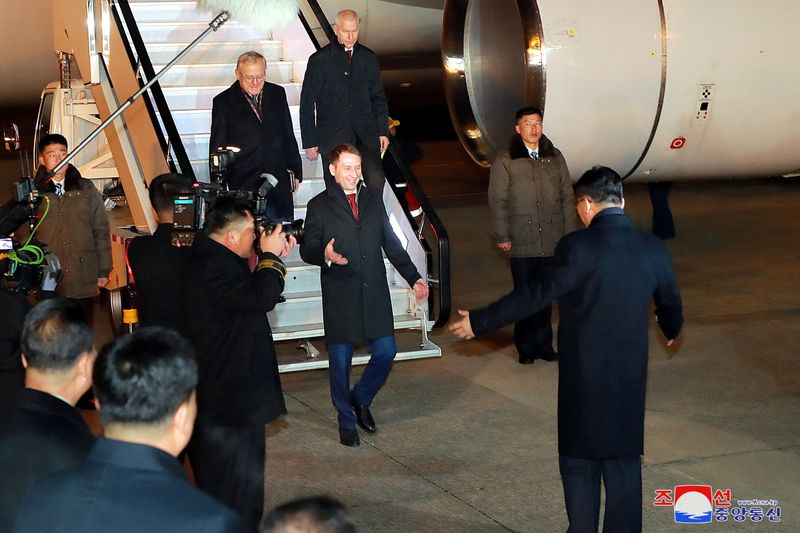Russian resources minister visits North Korea amid new missile development
2023.11.15 02:26
5/5

© Reuters. A Russian delegation led by Alexander Kozlov, the minister of natural resources, arrives in Pyongyang to participate in the 10th meeting of the Trade, Economic and Scientific and Technological Cooperation Committee between the government of the Democratic
2/5
By Hyunsu Yim and Josh Smith
SEOUL (Reuters) -A Russian delegation led by natural resources minister Alexander Kozlov is visiting Pyongyang, North Korean state media said on Wednesday, as the politically isolated state announced new progress in its banned ballistic missile programme.
Kozlov arrived on Tuesday, as U.S. Defense Secretary Lloyd Austin met with U.N. member states enforcing the Korean War armistice in Seoul and said they were concerned that China and Russia are helping North Korea expand its military capabilities by enabling Pyongyang to evade U.N. sanctions.
Russia and North Korea were conducting talks on the economy, science and technology, KCNA state media reported, without elaborating.
Kozlov told a reception that Russia wants to develop “substantial cooperation” with North Korea based on the agreements made by Russian President Vladimir Putin and North Korean leader Kim Jong Un when they met in September in Russia’s far east, KCNA reported.
He also cited North Korea’s “full support” for Russia over regional and international issues, the report said.
A delegation led by the country’s culture minister left for St. Petersburg on Tuesday to attend a cultural event, KCNA said in another article.
North Korea is in its final stages of preparation for the launch of a spy satellite, and appears to have received technical assistance from Russia, South Korea’s intelligence agency said this month.
NEW MISSILE ENGINES
North Korean state media also reported on Wednesday that the country had successfully conducted static tests of “new-type high-thrust solid-fuel engines” for intermediate-range ballistic missiles (IRBMs).
“The test provided a sure guarantee for reliably accelerating the development of the new-type IRBM system,” KCNA said.
The announcement came on the same day South Korea and the U.S. held a joint aerial exercise involving a U.S. B-52 strategic bomber alongside fighter jets as a show of force aimed at Pyongyang, South Korea’s defence ministry said.
North Korea’s General Missile Bureau attached great significance to the new IRBM, saying the recent tests are essential for enhancing the strategic offensive capabilities of the military in light of “the grave and unstable security environment facing the country” and the “vicious” collusion of its enemies, KCNA added.
Military analysts say solid-fuel missiles are easier and safer to operate, and require less logistical support, making them harder to detect and more survivable than liquid-fuel weapons.
This year North Korea tested its first solid-fuel intercontinental ballistic missile (ICBM) – the largest category of ballistic missile – and also uses the technology in a range of smaller weapons.
North Korea’s missile programme, as well as its nuclear weapons, have been banned by U.N. Security Council resolutions, which imposed sanctions on the country.
Washington has accused North Korea of supplying military equipment to Russia for use in its war with Ukraine, and Moscow of providing technical military support to help North Korea.
North Korea and Russia have denied any arms deals, though their leaders pledged closer military cooperation at their September summit.








